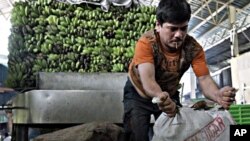Nearly 20 million people in the Asia-Pacific region were kept in poverty last year by rising food prices, according to a U.N. study. The United Nations says governments in the region need to better control inflation or else millions more people could be impoverished.
The study says high food prices prevented 19.4-million people in the Asia Pacific from escaping poverty.
The U.N. Economic and Social Commission for Asia and the Pacific in Bangkok says bad weather in key food-producing countries led to a spike in some prices compared to last year.
The United Nations says the region’s poor spend up to 70 percent of their income on food and that inflation affects them the most.
The cost for wheat jumped by nearly 80 percent in the past year, while cooking oil is up by 65 percent.
U.N. ESCAP Chief Economist Nagesh Kumar says if prices continue to rise, millions more people could be forced into poverty.
"Depending upon how much is the price rise, we estimate that between 10- to 42-million people will be affected in 2011, who are either to be pushed into poverty or prevented to get out of poverty,” Kumar said. “So, this is becoming a serious concern."
The retail price of rice, Asia’s main staple, is up in Bangladesh by 33 percent and in China and Indonesia by 23 percent. But the region’s major producers, Thailand and Vietnam, are having good harvests that are expected to keep rice prices steady.
Nonetheless, Kumar says governments in the region need to act to prevent food prices from getting out of control.
"You know countries like India, Pakistan, Bangladesh, and even in Southeast Asia some countries like Indonesia, Vietnam, Philippines, are vulnerable,” he added. “So, we need to really pay attention in these countries that food prices are restrained as much as possible then side-by-side we pay attention to enhancing the agriculture productivity."
To rein in food prices, U.N. ESCAP says in the short term countries can tighten monetary policy, lower taxes and tariffs, and free up imports while raising food stocks.
The United Nations says countries also need to reverse a neglect of investment in agriculture, conversion of some cereals into bio-fuels, and speculative investment.
High Food Prices in Asia-Pacific Keep 19 Million in Poverty




